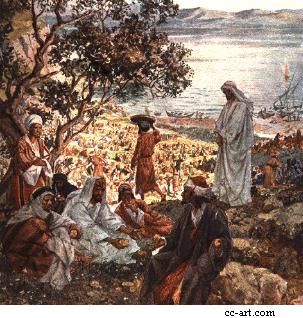Seventh Sunday after Trinity
Leo, Bishop, touching on the Gospel
Sevent Sunday after
Trinity Home
LORD of all power and might, who art the author and giver of all good things; Graft in our hearts the love of thy Name, increase in us true religion, nourish us with all goodness, and of thy great mercy keep us in the same; through Jesus Christ our Lord. Amen.

Romans vi. 19 & St. Mark viii. 1
Leo the Great, Bishop of Rome
Sermon XLVI.

A lesson touching on the appointed Gospel and the two natures of Christ
II. All the actions of Christ reveal the presence of the twofold nature.
And so, dearly-beloved, when in reading or hearing the Gospel you find certain things in our Lord Jesus Christ subjected to injuries and certain things illumined by miracles, in such a way that in the same Person now the Humanity appears, and now the Divinity shines out, do not put down any of these things to a delusion, as if in Christ there is either Manhood alone or Godhead alone, but believe both faithfully, worship both right humbly; so that in the union of the Word and the Flesh there may be no separation, and the bodily proofs may not seem delusive, because the divine signs were evident in Jesus. The attestations to both natures in Him are true and abundant, and by the depth of the Divine purpose all concur to this end, that the inviolable Word not being separated from the passible flesh, the Godhead may be understood as in all things partaker with the flesh and flesh with the Godhead. And, therefore, must the Christian mind that would eschew lies and be the disciple of truth, use the Gospel-story confidently, and, as if still in company with the Apostles themselves, distinguish what is visibly done by the Lord, now by the spiritual understanding and now by the bodily organs of sight. Assign to the man that He is born a boy of a woman: assign to God that His mother’s virginity is not harmed, either by conception or by bearing. Recognize “the form of a slave” enwrapped in swaddling clothes, lying in a manger, but acknowledge that it was the Lord’s form that was announced by angels, “proclaimed by the elements[1],” adored by the wise men. Understand it of His humanity that he did not avoid the marriage feast: confess it Divine that he turned water into wine. Let your own feelings explain to you why He shed tears over a dead friend: let His Divine power be realized, when that same friend, after mouldering in the grave four days, is brought to life and raised only by the command of His voice. To make clay with spittle and earth was a work of the body: but to anoint therewith and enlighten the eyes of the blind is an undoubted mark of that power which had reserved for the revelation of its glory that which it had not allowed to the early part of His natural life. It is truly human to relieve bodily fatigue with rest in sleep: but it is truly Divine to quell the violence of raging storms by a rebuking command. To set food before the hungry denotes human kindness and a philanthropic spirit: but with five loaves and two fishes to satisfy 5,000 men, besides women and children, who would dare deny that to be the work of Deity? a Deity which, by the co-operation of the functions of true flesh, showed not only itself in Manhood, but also Manhood in itself; for the old, original wounds in man’s nature could not be healed, except by the Word of God taking to Himself flesh from the Virgin’s womb, whereby in one and the same Person flesh and the Word co-existed.
HOME